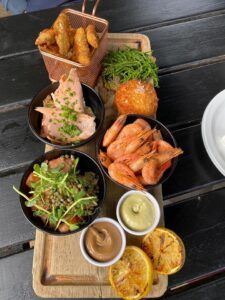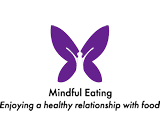 One To One Food Coaching
One To One Food Coaching
~ Do you regularly overeat or binge eat?
~ Would you describe yourself as an emotional or comfort eater? Do you turn to food to ‘cope’?
~ Do you tend to eat mindlessly and on ‘autopilot’? Perhaps you enjoy eating healthy meals but you can’t control excessive grazing or snacking?
~ Have you had enough of dieting, but do you still want to lose weight?
~ Do you feel lost in terms of how to approach healthy, balanced eating and/or weight loss?
~ Do you experience a lot of food guilt, and see your eating as either ‘good’ or ‘bad’?
What Food Can Symbolise
For some people, when life is going on around them, eating can feel like a relief. It can help to release tension and calm them down, or they might see eating as a chance to have a break, or providing moments of escapism. Food might feel like one thing they CAN have when other areas of their life seem out of control. Or perhaps they feel that all areas of their life are working well, but it’s just food that they can’t seem to manage.
Food and eating can therefore symbolise different things to different people, whether it’s a way to relax or have a break, a means of calming down, distracting or numbing oneself when things feel difficult or overwhelming; it can be a way to reward oneself, let go or decompress, a way to put things off (procrastinate), and it can even be a means of rebelling or rule-breaking. Food might be used as a way to self-soothe or even self-punish. Their eating is then followed by feelings of guilt and shame.
Building Self-Awareness And Insight
A person’s relationship with food can be quite complex, because it’s important to look at the whole picture of a person’s life, but if you want to develop better eating habits, feel more in charge of food, put an end to yo-yo dieting and address your relationship with food, my one-to-one sessions offer you the opportunity to do that, helping you to become more self-aware, not just of your eating patterns, but your thoughts, feelings and attitudes, which influence your eating. With increased awareness and knowledge, you’ll be in a better position to create strategies that enable you to set up a happier, more balanced, and personalised way of eating that’s suited to you. Food psychology is a fascinating area, so if you embark on food coaching sessions, see it as an interesting project- not just about an end goal, but a transformative, insightful process.
How The Past Can Influence Eating Habits, Body Image and Self-Worth
To have a good relationship with food, you need to have a good relationship with yourSELF. When looking at our relationship with food, eating habits and body image, it’s important to look at our past. Our childhood can positively or negatively affect our relationship with food, our self-concept, our current relationships, our belief systems, body image and general behaviour well into adulthood. A person might have been told as a child to clear their plate, or they might have had a mother who was preoccupied with dieting and restricted food for the whole family, or who told their child that they must never get fat. Or a child might have been told that they were ugly or stupid. Perhaps food was heavily restricted, or in contrast, there were no boundaries around food. TV dinners and ultra-processed meals might have been a big feature in a person’s childhood, or perhaps a person was brought up in a chaotic home, that was even a place of violence and abuse. Food can also have positive connotations too- perhaps the family enjoyed eating together, and food is now a big comfort for a person in adulthood- perhaps they even put food on a pedestal.
A person might have a strong inner critic, which can have roots in their childhood. This inner critic might have a knock-on effect in different aspects of their life, including their relationship with food, and can be associated with low self-worth. They might seek validation or attention from others through their appearance, which might cause them to get trapped in yo-yo dieting, or their validation-seeking might be through their career success, which could lead to exhaustion, comfort eating or reward eating. The concept of self, or identity, can help us to understand people’s underlying motivations, which influences behaviour, both helpful and unhelpful.
 Food Guilt And Shame
Food Guilt And Shame
Many people feel guilt and shame around their eating. If a person binge eats because they feel sad, their focus is probably more on the fact that they’ve binged, rather than the fact they feel sad. It’s important to understand the reasons underlying food issues- feeling angry at yourself, or feeling guilty about what you’ve eaten will get you nowhere. I help the client to unpick and identify what’s happening on a deeper level, and address what’s driving the binge eating.
Addressing The ‘Diet Head’
Not all the clients I work with want to, or need to, lose weight. Some people might want to specifically address overeating or binge eating, improve their overall relationship with food or nutritional knowledge to make more healthy, balanced and satisfying food choices, or tackle a lifetime of disordered eating. But for those with a history of yo-yo dieting, there’s often a self-limiting, rule-bound ‘diet head’ telling you what you should and shouldn’t be eating, and an inner critic that kicks off whenever you eat ‘bad’ food, keeping you trapped in a cycle of guilt and a sense of failure. It’s not you failing at the diet, but the diet failing you, because most diets are restrictive and unsustainable. I help clients to adopt a more long-term approach to their eating, and to move away from unhelpful behaviours such as obsessive calorie counting.
Start With Small, Consistent Changes
 You need to be patient with yourself as there might be decades of thought patterns and habitual eating behaviours to address, but building self-awareness is a great starting point- once you’ve gained greater self-insight into your eating habits, thought patterns, attitudes and belief systems in relation to food, eating and weight loss, you can then find strategies for positive, long-term change. You can’t expect to radically change your eating habits overnight, and so small adjustments is key, making it feel achievable. Just a few small, consistent changes to a person’s eating behaviour can make a difference quite quickly, and this can help boost motivation and self-belief. A very common issue to address is all-or-nothing thinking, as the mindful eating approach encourages a more ‘middle-way’ mindset, enabling a person to avoid extreme behaviours and achieve more balance. We tend to be happier human beings when we’re doing things in balance.
You need to be patient with yourself as there might be decades of thought patterns and habitual eating behaviours to address, but building self-awareness is a great starting point- once you’ve gained greater self-insight into your eating habits, thought patterns, attitudes and belief systems in relation to food, eating and weight loss, you can then find strategies for positive, long-term change. You can’t expect to radically change your eating habits overnight, and so small adjustments is key, making it feel achievable. Just a few small, consistent changes to a person’s eating behaviour can make a difference quite quickly, and this can help boost motivation and self-belief. A very common issue to address is all-or-nothing thinking, as the mindful eating approach encourages a more ‘middle-way’ mindset, enabling a person to avoid extreme behaviours and achieve more balance. We tend to be happier human beings when we’re doing things in balance.
“I’m thrilled that I’m losing weight and I can’t believe that I can actually lose weight and not hate the process. It’s all thanks to you!”
Session Format
My food coaching sessions (face-to-face or online) are for people who are looking for personalised, one-to-one support. The sessions are based on the concepts of mindful eating, and depending on individual client needs they can focus on the psychological (mindset) aspects of your eating (such as emotional eating) or they can focus more on your actual diet, where we might discuss the nutritional components, enabling us to create a realistic, personalised eating plan (meal and snack ideas). The sessions can therefore focus more on mindset, or more on nutrition, or they might address a mixture of the two. Commonly, emotional eating is explored in depth, but we might also do a re-cap on nutrition, if the client is seeking clarity or further information relating to nutrition which could help them to make healthier food choices.
Flexibility Of Sessions
 It is recommended (but not compulsory) that clients complete a minimum of six sessions (taken weekly or fortnightly)- this is because implementing new eating / lifestyle habits can take time, and clients find that regular contact and support helps to keep them focused and motivated. The number of sessions required will also depend very much on individual needs and preferences.
It is recommended (but not compulsory) that clients complete a minimum of six sessions (taken weekly or fortnightly)- this is because implementing new eating / lifestyle habits can take time, and clients find that regular contact and support helps to keep them focused and motivated. The number of sessions required will also depend very much on individual needs and preferences.
If clients choose to have ongoing sessions, they have the option of reducing session frequency. For example, they might start off with weekly or fortnightly sessions (most people find fortnightly useful), but further down the line they might choose to see me for ‘check-ins’ once a month, once every 6-8 weeks, or even once every 3-6 months.
From my experience of working with clients, a number of sessions over time is much more effective than just two or three sessions over a short period, as building new, sustainable habits can take time, and we can slip back into old habits. Regular sessions over a few months offer the client a great opportunity to receive ongoing support, develop and consolidate skills and knowledge, maintain motivation and re-visit or ‘tweak’ strategies for any particular challenges they might be facing.
“I was a victim of 1980s dieting”
 Booking A Food Coaching Appointment And Prices
Booking A Food Coaching Appointment And Prices
To book a session or to find out more about my one-to-one food coaching sessions, please Whatsapp/text me or give me a call (Emma Randall): 07961 423120 or email me: info@mindfuleating.org.uk
Initial session (90 minutes): £75
Subsequent sessions (60 minutes): £60
SPECIAL OFFER: Buy three sessions upfront, and get a fourth session HALF PRICE (£30). You can also pay as you go, or start a batch of sessions at any point. For any subsequent batches of sessions, the 4th session each time is also half price (£30).
Session availability: Weekday morning, afternoon and evenings, and some Saturdays.
Payment Options: BACS, cash or cheque.
“Mindful eating is not a quick fix but has helped me explore and understand my relationship with food and helped me understand how small but consistent changes can help me take control of my diet.”
“This has been life changing, I feel so comfortable with my choices and feel like food no longer has a hold over me.”
“I was eating totally the wrong things before, leaving me hungry all the time and still putting on weight. I’ve now lost over a stone in 4 months. I emphasise that this is not a diet! This is about just making better decisions about food”.
“Emma suggested small (and often easy) adjustments to my daily habits to help me be more mindful of my eating and start to see food as a friend and not foe”.
“My mindful eating sessions with Emma have made a huge and lasting difference to how I feel about food and myself more generally. Emma is very easy to open up to and never judgemental.”
For full reviews from clients, click HERE.
My Other Services
Online workshop: ‘How To Stop Binge Eating’.
See the events schedule and purchase tickets for any of my events via Eventbrite.
For tips, information and advice see my blogs.
Follow me on Instagram.

